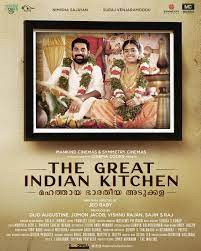Review of Malayalam Movie 'The Great Indian Kitchen' directed by Jeo Baby

The movie revolves around the protagonist couple, Suraj and Nimisha, who get married hardly knowing each other’s likes and dislikes and cultural background. All they exchange during the ‘Pennu Kaanal’ (first time, where the boy meets the girl at her home in arranged marriages) is a coy smile. It starts off well, as Suraj’s mother introduces Nimisha to the taste preferences of her father-in-law, which is the manual way of preparing food using hearth, mortar pestle etc and carries out most of the hard labour herself, leaving ground work to Nimisha. And when her mother-in-law has to leave the house for some reason, Nimisha has to take complete charge of the household.
Here’s where the differences in culture and opinions shoots up, leading to harsh exchange of words, resulting in unpleasant situation in the family. For instance, Suraj and his father has the habit of leaving the food waste and the used plates on the table in a distasteful manner, which nauseates Nimisha as she cleans them those with her hands. Planning what next to cook, cutting, cooking, cleaning dishes, washing and folding clothes, sweeping and mopping floors- this routine goes on and on for her and the cinematographer has done a great job in capturing the fatigue of the wife. When Nimisha laments to her mother about her plight, she takes side of their in-laws, which irks her all the more.
Planning what next to cook, cutting, cooking, cleaning dishes, washing and folding clothes, sweeping and mopping floors- this routine goes on and on for her and the cinematographer has done a great job in capturing the fatigue of the wife.
When she expresses her interest in applying for the Dance Teacher post, it gets brushed aside by her father-in-law for the reason that it wouldn’t suit their family and they are expected to take care of family chores only. While Suraj evasively answers that he would support but advises her not to do it now, Nimisha’s mother-in-law asks her to apply, without citing her name, which subtly reveals that she doesn’t want her daughter-in-law to limit herself within the kitchen and there is a need for women to live their lives as well.
Nimisha also is not able to have a good romantic relationship with her husband because of her suppressed hatred towards the practices of the family and when she expresses to her husband of her need for ‘foreplay’, Suraj makes a deriding remark that she, as a ‘woman’, knows all these stuffs. Her frustration gets aggravated by the way she gets treated during her periods, which makes her feel that the family is rife with outdated practices, where she is trying hard to fit in and accept these impositions on her. In the end, she takes a decision to set herself free from the familial shackles and accepts her job as a dance teacher.
My personal take on this movie is that it seemed out of touch with reality in many places. While I don’t deny that there still are families where the outdated practices are in vogue and women are exploited given their adjustable nature, in many families, it isn’t as bad as it has been portrayed in the film. It is also hard to understand that if the female protagonist is so brave that she walked away from the family and choose a career of her preference, why didn’t she speak up openly either before the marriage or atleast after the marriage, as to what she is expecting from her would be/husband. For any person who grows up in a family like Suraj’s character does, it is difficult to comprehend things from a woman’s point of view. Perhaps, if the wife and husband sat together as a couple to resolve things and talk straight from heart, things would have gotten better. This film sends a strong message that retaliation through exit is the only option when things don’t go one’s way. Rather, in reality, persistence, patience and open communication are the hallmark qualities of any good and happy family. Also, it is not befitting for a movie titled ‘The Great Indian Kitchen’ to target one community’s practices and religious sentiments, disrespecting the secular right that our Constitution has bestowed upon us.
This is one-time watchable movie, more so, to understand how not lead a family and analyse how we could make our lives better by caring, sharing, loving and mutually adjusting to accommodate each other’s needs and genuine desires. The biggest takeaway is that both the man and the woman should understand the cultural value and practices of each other’s family and either be ready to embrace that as their own or move away from the proposal, so that you can save yourself and the other person from nightmarish future.
Spoiler alert: Men from the older generation who are planning to watch this movie are more likely to return with a heavy and a guilty heart, while their better halves will get a feel of seeing their younger selves on the screen.
Newsletter
About Sammy's MindChirps
Hello! Welcome to Sammy's MindChirps. I'm glad you are here. To me, the word LIFE is an acronym of Laboratory with Infinite Freedom to Experiment. It's more like a kaleidoscope offering amazing learning opportunities as we grow and explore various facets of life. So this blog is a platform where I share anything that I find interesting (with my two cents, of course :D). I assure that you will have some new learning when you exit the blog. And do share your feeback on the blog or anything you want me to write about in this blog by dropping an email to mindchirps@gmail.com